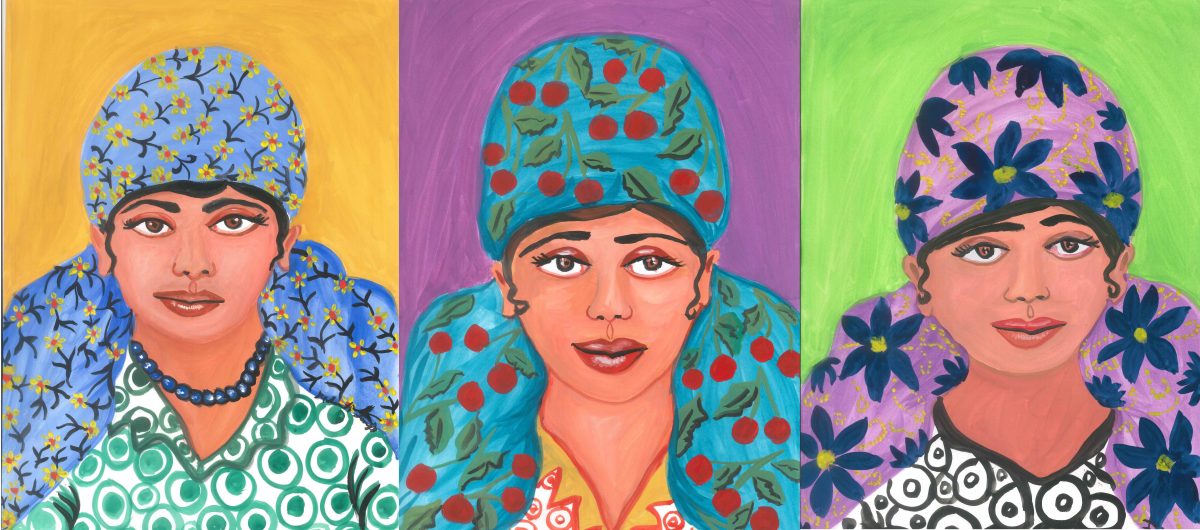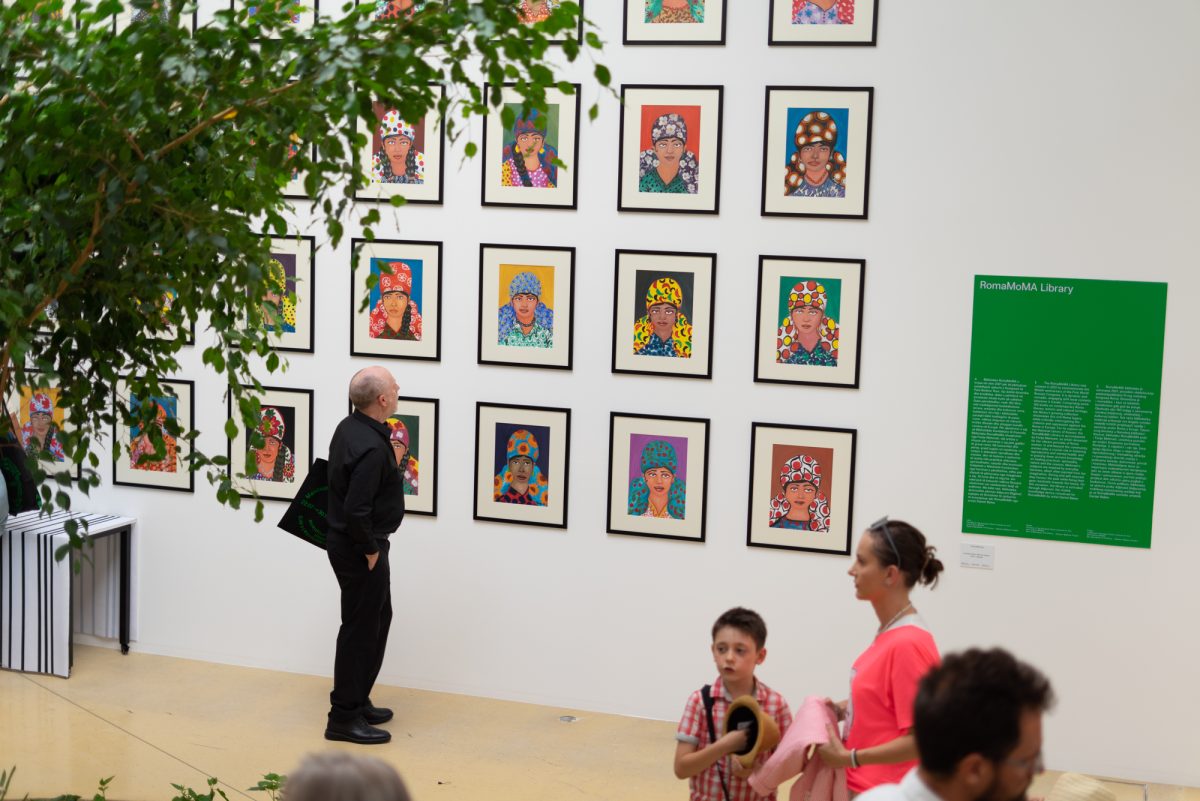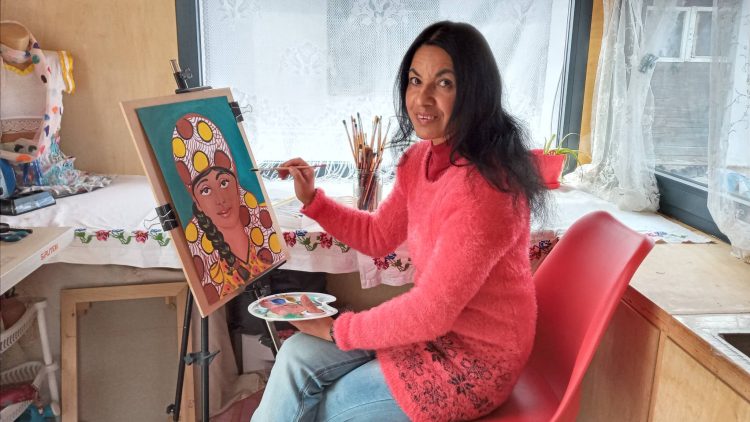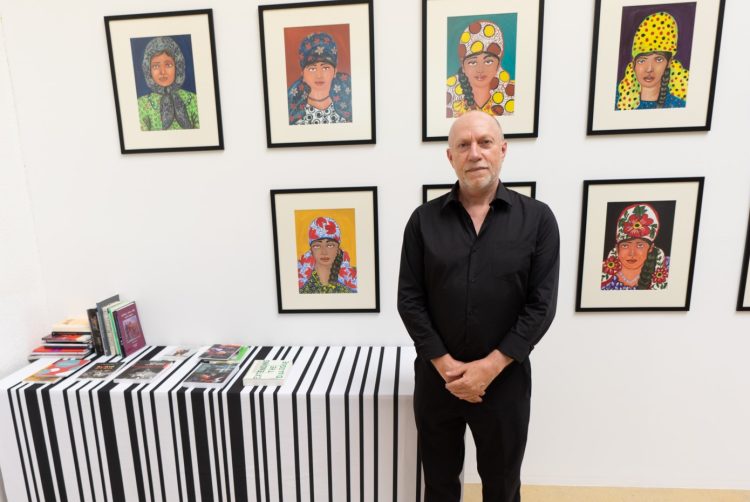11290
Exhibition Site: National Library Kosovo, Sheshi “HASAN PRISHTINA” p.n, Prishtina, Kosovo
Opening Event: 21 July 2022, 5-7:30pm
Public Dates: 22 July – 30 October 2022
Commissioner: European Roma Institute for Arts and Culture

Farija Mehmeti: Untitled, Roma Women series, 2012-ongoing
Roma Rajni: RomaMoMA Library featuring Daniel Baker and Farija Mehmeti
ERIAC brings together the painterly oeuvre of Farija Mehmeti and the RomaMoMA Library at the National Library of Kosovo. The RomaMoMA Library was created in 2021 to commemorate the fiftieth anniversary of the First World Romani Congress. It is dynamic and nomadic, engaging with local contexts wherever it travels. Comprising some 150 books on contemporary Roma literary, artistic and cultural heritage, the library’s growing collection showcases this rich Roma legacy, while critically interrogating the violence and oppression faced by the Roma in Europe. On this occasion, the library is activated through Adjacent, the mobile knowledge device conceived for RomaMoMA by artist Daniel Baker, and the exhibition of 39 portraits by Kosovar painter Farija Mehmeti. “Adjacent is a development of the artist’s interest in the relationship between the virtual and the embodied, and the representation of abstract thought through physical and optical means – mechanisms of knowledge distribution and the construction of meaning which lay at the heart of Roma visual culture” (D. Baker). Mehmeti displays a multifaceted mosaic of imaginary characters to contemplate and honour the everyday heroism and struggle for existence of ordinary Roma women. The artist’s portrayals of powerful brown women wearing traditional Romani fabrics and jewellery in front of vibrant backgrounds transcend traditional forms of biased representation of Roma women, and reclaim the defining moment of identity and storytelling, too often assigned by non-Roma, as historicised and perpetuated by dominant culture. In depicting these everyday female heroes, Mehmeti cultivates both a sense of the past herstories, as well as a foresight for the future. Her portraits are vehicles to remember and unearth suppressed Roma forms of knowledge — on strategies for reproductive health, the preservation of mental health, and healing practices in general, as well as Roma wisdom on nature and the cosmos. As memories and embodied experience of these reservoirs of knowledge, the portraits also serve as a reminder for the elders in the community who hold it and pass it on to succeeding generations. With her vibrant and brilliant visual vocabulary, Farija Mehmeti thus enables a view through time in honouring the past, and offering ways of continuing to imagine the interdependencies and inseparability of existence in community, while providing a passage into the shaping of new futures.

© Esko Duraki / ERIAC

Farija Mehmeti
Born in Pristina in 1978, lives in the village of Lepina. Mehmeti started painting in 2001 after watchingher brother Bajram paint scenes of Roma life. She paints portraits of Romani women, mostly from imagination, showing their colourful way of dressing up, in order to preserve this tradition and the culture of the Roma.

Daniel Baker
Baker is a Romani Gypsy artist, researcher, and curator. Originally from Kent, and currently based in London, his work is exhibited internationally and can be found in collections across the globe. Baker earned a PhD in 2011 from the Royal College of Art, with his dissertation, “Gypsy Visuality: Gell’s Art Nexus and its Potential for Artists”, after previously earning an MA in Sociology/Gender and Ethnic Studies from Greenwich University, and a BA (Hons) in Fine Art from Ravensbourne College of Art and Design. Baker has contributed to numerous exhibitions, held various residencies, and curated several commissions. He previously worked as an exhibitor and consultant for the first and second Roma events at the International Art Exhibition of La Biennale di Venezia – “Paradise Lost” and “Call the Witness”, which took place during the 52nd and 54th International Art Exhibitions of La Biennale di Venezia, respectively. In 2018, hosting an open call for curators, an international jury consisting of Professor Dr Ethel Brooks, Tony Gatlif, Miguel Ángel Vargas, and ERIAC management selected Baker to curate the Roma Collateral Event at the 58th La Biennale di Venezia. Baker’s work examines the role of art in the enactment of social agency, through an eclectic practice that interrogates contemporary art discourse and its social implications via the reconfiguration of elements of the Roma aesthetic.
RomaMoMA Library
It was created in 2021 by ERIAC to commemorate the fiftieth anniversary of the First World Romani Congress. It is dynamic and nomadic, engaging with local contexts wherever it travels. Comprising some 150 books on contemporary Roma literary, artistic and cultural heritage, the library’s growing collection showcases this rich Roma legacy, while critically interrogating the violence and oppression faced by the Roma in Europe.
This is a “library on the road” that has been hosted by different institutions like SAVVY Contemporary (Berlin, Germany); Schafhof: the European Center for Art Upper Bavaria (Freising, Germany); Istituto Veneto di Scienze, Lettere ed Arti (Venice, Italy)
This library is not to be understood as a classical library that exclusively collects and preserves books and knowledge in order to make them accessible to the public, but rather an open and dynamic library, which, taking its departure from a body of materials built by ERIAC expertise, will be further developed in the course of the exhibition/event/hosting period, together with the visitors and the institutions.
The library is a “study room”, where everyone can come to read, discuss and comment on texts, and to produce new knowledge together. In line with emancipatory educational approaches, the RomaMoMA Library critically reflects the white, Western canon and expands it with postcolonial theoretical perspectives and voices from the Global South and diasporic communities.
The opening took place on 21 July 2022 with a concert by Gipsy Groove.
The speech of Timea Junghaus, ERIAC Executive Director, followed opening addresses from Jan-Axel Voss, Deputy Head of the Mission at the German Embassy in Pristhina; Gazmen Salijevic, Deputy Minister of Communities and Returns; Sylejman Elshani, Deputy Minister of Culture, Youth and Sport; Emilia van Lynden, Head of Marketing, Communications, Publications and Audience Development Manifesta 14; and artist Farija Mehmeti who delivered a speech in Romanes, interpreted by Avni Mustafa, ERIAC Media and Information Thematic Coordinator and Director of Roma Versitas Kosovo.
© Esko Duraki / ERIAC
Press coverage:

This project is implemented within the framework of Manifesta 14 Western Balkans project, and is co-funded by the European Union.